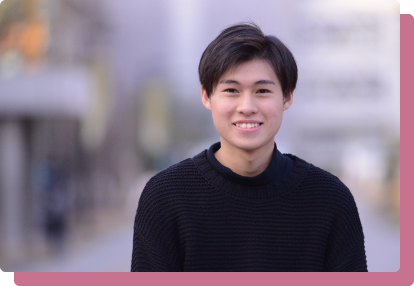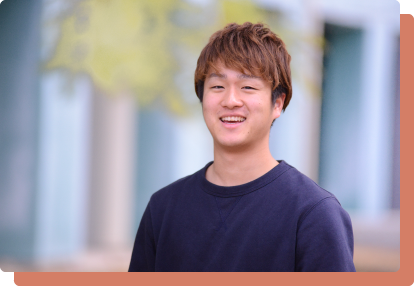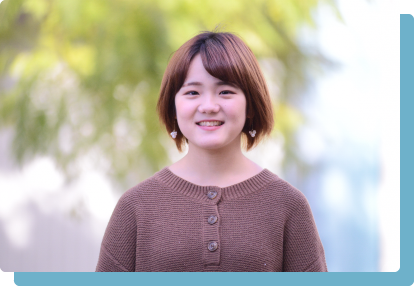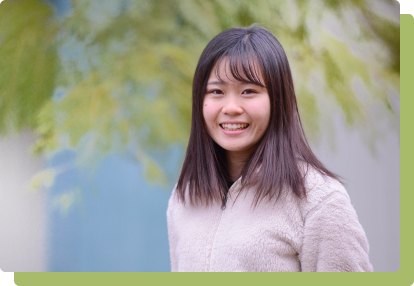Current student message
Studying at the University

Industrial Management
KASAOKA Taizen
From Matsuyama Minami High School [Ehime]
First-year students in the Department of Industrial Management participate in a First-Year Project Seminar class in addition to studying subjects like Management, Social Issues, and Bookkeeping. For this class, actual representatives from companies come in and share challenges from their respective industries, then the students engage in group work to consider solutions and make presentations. We also get to do a lot of practical, hands-on activities beyond just classroom learning and interact with people who are out in the workforce too. The curriculum helps bridge the disconnect between university students and the corporate world.
In ways like that, the courses are set up to cater to all kinds of different aspirations, from interests in regional revitalization, economics, or management to fondness for Ehime, or the dream of starting a business, which enables students to fully pursue the path that calls to them. For anyone who’s interested in building a broad base of knowledge and applying it in the region or in business, why not join us in the Department of Industrial Management?
A Goal of Regional Revitalization with Monozukuri Knowledge & Technology

Industrial Innovation
OMASA Sunao
From Osaki Kaisei High School [Hiroshima]
Students in the Department of Industrial Innovation take a desired course survey in the fourth quarter of their first year, then get actually assigned to their course starting with second-year classes. I got assigned to my preferred choice, the Monozukuri (Product Creation) Course, where I study subjects like Monozukuri Design and Engineering Mechanics. Starting in the third year, the campus for students in the Paper Industry Course moves to Shikokuchūō-shi City, and the one for those in the Marine Products Science Course, to Ainan-chō Town, where they study the main local industries, like the paper and fisheries industries, in even more depth. (Students in the Monozukuri Course study at the Jōhoku Campus in Matsuyama City.)
I’m studying monozukuri technologies with the goal of developing products made with wood to contribute to regional revitalization. Anyone with an interest in revitalizing local regions or industries, how about joining us in the Department of Industrial Innovation?
Region-Specific Community Development

Environmental Design
MASUDA An
From Takamatsu Daiichi High School [Kagawa]
Since the Department of Environmental Design has a framework integrating the humanities and sciences, it’s a department where even someone like me who followed a humanities course in high school and has interest in the field of architecture will be able to keep working toward their goal. Once you become a senior student, you can attend lectures in other departments or courses. So I’m thinking I’d like to attend architecture-related lectures outside my own department and course to acquire a varied knowledge base relevant to community development.
Life at university gives you a different sense of fulfillment than schooling up through high school. You have to make more choices of your own than in high school, and that can lead to both advantageous and undesirable outcomes depending on what you decide. The Department of Environmental Design is somewhere where everyone is enabled to take on challenges of their own choosing, so why not come give it a shot together with us?
Learning about Regional Charm through Fieldwork

Regional Resource Management
AKASHI Sawa
From Matsuyama Commercial High School [Ehime]
Three courses are offered in the Department of Regional Resource Management: The Agricultural, Mountain, and Fishing Villages Management Course that I’m in, along with the Cultural Resource Management Course, and the Sports and Health Management Course. Attending a lecture on the topic of “What are regional resources?” considered from entirely different points of view, I learned the importance of taking a broad perspective in the way you perceive things.
Lectures like that have helped me develop approaches to perceiving things, as well as thinking skills. Actually venturing out into the field, I’ve had many chances to see for myself up close how hard agriculture can be and to experience the kindness of the producers and local residents. As I’ve made my way out into the field time and time again, I’ve come to learn even more about the region’s charms, and I’m finding out about the kind of field-based realizations that won’t be found in a textbook.
It takes courage to make a step out into unfamiliar territory, but just taking the plunge will enable you to experience senses of growth like you’d never even imagined.
